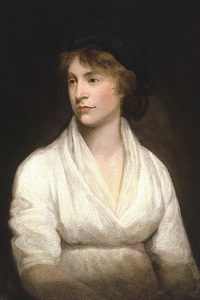Vindication of the Rights of Woman, Part 5
Written Text
My Author and Disposer, what thou bidst
Unargued I obey; So God ordains;
God is thy law, thou mine:--to know no more
Is Woman's happiest knowledge and her praise. (8)
These are exactly the arguments that I have used to children; but I have added, your reason is now gaining strength, and, till it arrives at some degree of maturity, you must look up to me for advice -- then you ought to think, and only rely on God.
Yet in the following lines Milton seems to coincide with me; when he makes Adam thus expostulate with his Maker.
Hast thou not made me here thy substitute,
And these inferior far beneath me set?
Among unequals what society
Can sort, what harmony or true delight?
Which must be mutual, in proportion due
Giv'n and received; but in disparity
The one intense, the other still remiss
Cannot well suit with either, but soon prove
Tedious alike: of fellowship I speak
Such as I seek, fit to participate
All rational delight – (9)
In treating, therefore, of the manners of women, let us, disregarding sensual arguments, trace what we should endeavour to make them in order to co-operate, if the expression be not too bold, with the supreme Being.
By individual education, I mean, for the sense of the word is not precisely defined, such an attention to a child as will slowly sharpen the senses, form the temper, regulate the passions as they begin to ferment, and set the understanding to work before the body arrives at maturity; so that the man may only have to proceed, not to begin, the important task of learning to think and reason.
To prevent any misconstruction, I must add, that I do not believe that a private education can work the wonders which some sanguine writers have attributed to it. Men and women must be educated, in a great degree, by the opinions and manners of the society they live in. In every age there has been a stream of popular opinion that has carried all before it, and given a family character, as it were, to the century. It may then fairly be inferred, that, till society be differently constituted, much cannot be expected from education. It is, however, sufficient for my present purpose to assert, that, whatever effect circumstances have on the abilities, every being may become virtuous by the exercise of its own reason; for if but one being was created with vicious inclinations, that is positively bad, what can save us from atheism? or if we worship a god, is not that god a devil?
Consequently, the most perfect education, in my opinion, is such an exercise of the understanding as is best calculated to strengthen the body and form the heart. Or, in other words, to enable the individual to attain such habits of virtue as will render it independent. In fact, it is a farce to call any being virtuous whose virtues do not result from the exercise of its own reason. This was Rousseau's opinion respecting men: I extend it to women, and confidently assert that they have been drawn out of their sphere by false refinement, and not by an endeavour to acquire masculine qualities. Still the regal homage which they receive is so intoxicating, that till the manners of the times are changed, and formed on more reasonable principles, it may be impossible to convince them that the illegitimate power, which they obtain, by degrading themselves, is a curse, and that they must return to nature and equality, if they wish to secure the placid satisfaction that unsophisticated affections impart. But for this epoch we must wait -- wait, perhaps, till kings and nobles, enlightened by reason, and, preferring the real dignity of man to childish state throw off their gaudy hereditary trappings: and if then women do not resign the arbitrary power of beauty--they will prove that they have less mind than man.
I may be accused of arrogance; still I must declare what I firmly believe, that all the writers who have written on the subject of female education and manners from Rousseau to Dr. Gregory (10), have contributed to render women more artificial, weak characters, than they would otherwise have been, and, consequently, more useless members of society. I might have expressed this conviction in a lower key; but I am afraid it would have been the whine of affectation, and not the faithful expression of my feelings, of the clear result, which experience and reflection have led me to draw. When I come to that division of the subject, I shall advert to the passages that I more particularly disapprove of, in the works of the authors I have just alluded to; but it is first necessary to observe, that my objection extends to the whole purport of those books, which tend, in my opinion, to degrade one half of the human species, and render women pleasing at the expense of every solid virtue.
Though, to reason on Rousseau's ground, if man did attain a degree of perfection of mind when his body arrived at maturity, it might be proper, in order to make a man and his wife one, that she should rely entirely on his understanding: and the graceful ivy, clasping the oak that supported it, would form a whole in which strength and beauty would be - equally conspicuous. But, alas! husbands, as well as their helpmates, are often only overgrown children: nay, thanks to early debauchery, scarcely men in their outward form -- and if the blind lead the blind, one need not come from heaven to tell us the consequence.
Many are the causes that, in the present corrupt state of society, contribute to enslave women by cramping their understandings and sharpening their senses. One, perhaps, that silently does more mischief than all the rest, is their disregard of order.
To do every thing in an orderly manner, is a most important precept, which women, who, generally speaking, receive only a disorderly kind of education, seldom attend to with that degree of exactness that men, who from their infancy are broken into method, observe. This negligent kind of guess-work, for what other epithet can be used to point out the random exertions of a sort of instinctive common sense, never brought to the test of reason? prevents their generalizing matters of fact-- so they do today, what they did yesterday, merely because they did it yesterday.
This contempt of the understanding in early life has more baneful consequences than is commonly supposed; for the little knowledge which women of strong minds attain, is, from various circumstances, of a more desultory kind than the knowledge of men, and it is acquired more by sheer observations on real life, than from comparing what has been individually observed with the results of experience generalized by speculation. Led by their dependent situation and domestic employments more into society, what they learn is rather by snatches, and as learning is with them, in general, only a secondary thing, they do not pursue any one branch with that persevering ardour necessary to give vigour to the faculties, and clearness to the judgment. In the present state of society, a little learning is required to support the character of a gentleman; and boys are obliged to submit to a few years of discipline. But in the education of women, the cultivation of the understanding is always subordinate to the acquirement of some corporeal accomplishment: even while enervated by confinement and false notions of modesty, the body is prevented from attaining that grace and beauty which relaxed half-formed limbs never exhibit. Besides, in youth their facul ties are not brought forward by emulation; and having no serious scientific study, if they have natural sagacity it is turned too soon on life and manners. They dwell on effects, and modifications, without tracing them back to causes; and complicated rules to adjust behaviour are a weak substitute for simple principles.
As a proof that education gives this appearance of weakness to females, we may instance the example of military men, who are, like them, sent into the world before their minds have been stored with knowledge or fortified by principles. The consequences are similar; soldiers acquire a little superficial knowledge, snatched from the muddy current of conversation, and, from continually mixing with society, they gain, what is termed a knowledge of the world; and this acquaint ance with manners and customs has frequently been confounded with a knowledge of the human heart. But can the crude fruit of casual observation, never brought to the test of judgment, formed by comparing speculation and experience, deserve such a distinction? Soldiers, as well as women, practice the minor virtues with punctilious politeness. Where is then the sexual difference, when the education has been the same? All the difference that I can discern, arises from the superior advantage of liberty, which enables the former to see more of life.







